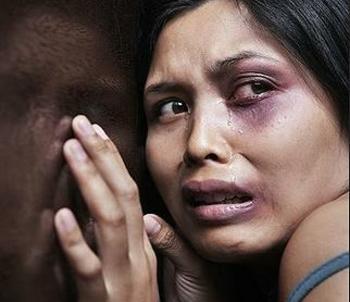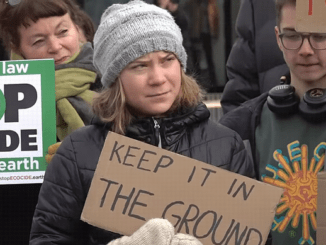
NEW YORK, New York, April 9, 2020 (ENS) – “Peace is not just the absence of war. Many women under lockdown for COVID-19 face violence where they should be safest: in their own homes. Today I appeal for peace in homes around the world,” UN chief António Guterres said Sunday. “I urge all governments to put women’s safety first as they respond to the pandemic.”
In March, Guterres called for a cease-fire on the world’s battlefields so the international community could focus its attention on stopping the virus and helping those who have been infected with COVID-19, the deadly respiratory disease caused by the novel coronavirus that emerged in Wuhan, China in late December.
Now Guterres is urging the world to address a “horrifying global surge in domestic violence” directed towards women and girls, linked to lockdowns imposed by governments responding to the global pandemic.
COVID-19 has as of 2:00 am CEST, April 7, resulted in 1,279,722 confirmed cases of the virus, including 72,616 deaths, reported to the World Health Organization (WHO).

The combination of economic and social stresses brought on by the pandemic, as well as restrictions on movement, have sharply increased the numbers of women and girls facing abuse in almost all countries. By comparison, even before the global spread of the new coronavirus, statistics show that a third of women around the world experienced some form of violence in their lives.
In the year 2017, 87,000 women were intentionally killed, and more than half of those were killed by intimate partners or family members.
Violence against women is as serious a cause of death and incapacity among women of reproductive age as cancer, and a greater cause of ill health than traffic accidents and malaria combined.
The issue affects both developed and poorer economies. Nearly a quarter of female college students reported having experienced sexual assault or misconduct in the United States, while in parts of sub-Saharan Africa, partner violence is a reality for 65 percent of women.
Research by the World Health Organization details the impacts of violence on women’s physical, sexual, reproductive and mental health. Women who experience physical or sexual abuse are twice as likely to have an abortion, and abuse nearly doubles their likelihood of falling into depression.
In some regions, abused women are 1.5 times more likely than other women to acquire HIV, the virus that causes AIDS, and evidence exists that sexually assaulted women are 2.3 times more likely to have alcohol disorders.
Since the pandemic was declared by WHO on March 11, the UN is reporting that Lebanon and Malaysia, for example, have seen the number of calls to helplines double, compared with the same month last year. In China helpline calls have tripled; and in Australia, search engines such as Google are seeing the highest magnitude of searches for domestic violence help in the past five years.

These numbers indicate the scale of the problem, but only cover countries where reporting systems are in place. As the virus spreads in countries with weak institutions, less information and data will be available, but the UN expects that the vulnerability of women and girls will be higher.
Responding to the rise in violence is complicated by the fact the institutions are under a huge strain from the demands of dealing with the pandemic. “Healthcare providers and police are overwhelmed and understaffed,” said Secretary-General Guterres. “Local support groups are paralyzed or short of funds. Some domestic violence shelters are closed; others are full.”
Shelters have been converted into health facilities to treat COVID-19 patients, or are closed to new violence victims for fear of spreading COVID-19.
Police and other members of security forces may be less willing to arrest perpetrators of violence to limit their exposure to the virus, or are overwhelmed by enforcing lockdowns.
The UN chief urged all governments to make the prevention and redress of violence against women a key part of their national response plans for COVID-19, and outlined several actions that can be taken to improve the situation.
The UN has issued these domestic violence reduction recommendations:
* – Increase investment in online services and civil society organizations
* – Make sure judicial systems continue to prosecute abusers
* – Set up emergency warning systems in pharmacies and groceries
* – Declare shelters as essential services
* – Create safe ways for women to seek support, without alerting their abusers
* – Avoid releasing prisoners convicted of violence against women in any form
* – Scale up public awareness campaigns, particularly those targeted at men and boys
Executive Director of the United Nations agency UN Women, Phumzile Mlambo-Ngcuka said on Monday that confinement is fostering the tension and strain created by security, health and money worries and is increasing isolation for women with violent partners. She described the situation as “a perfect storm for controlling, violent behaviour behind closed doors.”
Domestic violence is already under-reported, with less than 40 percent of women who experience violence seeking help, said Mlambo-Ngcuka.
The pandemic is making reporting even harder, she said, due to “limitations on women’s and girls’ access to phones and helplines and disrupted public services like police, justice, and social services.”
These limitations “fuel impunity for the perpetrators,” she warned, adding that, in many countries, “the law is not on women’s side.”
“One in four countries have no laws specifically protecting women from domestic violence,” Mlambo-Ngcuka said.
Violence Against Women Surges Across the Globe
In Kosovo, the UN Population Fund (UNFPA) cited the Ministry of Justice in reporting a 17 percent jump in gender-based violence cases, with urban areas showing a higher incidence than rural locales.
On March 24, after dozens of COVID-19 cases were confirmed in Kosovo, the government declared a public health emergency and imposed a 13-hour curfew.
The UNFPA’s Besnik Sherifi urged women to “use the window of free-movement time” if they need to escape the house, but warned that the possibility of being locked up with an abuser for 13 hours a day “is something that should worry us all.”

UNFPA is providing support to shelters for survivors while working with faith-based organizations and religious leaders to raise awareness of the heightened risks of gender-based violence during the pandemic.
“We need to ensure that measures are in place to prevent, protect and mitigate the consequences of all forms of violence, stigma and discrimination, especially those against women and girls during quarantine and self-isolation processes and procedures,” said Visare Mujko-Nimani, UNFPA’s head of office in Kosovo.
Domestic violence rates have surged in France and South Africa, according to Voice of America. In South Africa, authorities said there were nearly 90,000 reports of violence against women in the first week of a lockdown.
Since the start of the pandemic, the UN reports that the number of calls to help lines have doubled in Lebanon and Malaysia, compared with the same month last year. In Malaysia, the government launched, and then was quickly forced to retract, a controversial campaign advising women not to nag their husbands and to refrain from being “sarcastic” when asking for help with household chores.
In China, the number of calls has tripled, the UN says.
In Australia, where the government has promised some A$91 million to address the problem as part of its COVID-19 response plan, Google reports a 75 percent increase in online searches for help with domestic violence.
Meanwhile, in Turkey, activists say the killing of women has risen sharply since the government issued a stay-at-home order on March 11.
In the United States, trapped at home with their abusers, some domestic violence victims are already experiencing more frequent and extreme violence, Katie Ray-Jones, the chief executive officer of the U.S. National Domestic Violence Hotline (NDVH), told Voice of America.
Domestic violence programs across the United States have cited increases in calls for help, in cities from Cincinnati to Nashville, Portland, Salt Lake City and statewide in Virginia and Arizona.
The National Domestic Violence Hotline warns that, “Abuse is about power and control. When survivors are forced to stay in the home or in close proximity to their abuser more frequently, an abuser can use any tool to exert control over their victim, including a national health concern such as COVID-19.”
One caller to the Hotline was “a health professional still living with their abuser.” This person “called and said they were physically abused that night because their abuser was sure they were trying to infect them with COVID-19.“
Here’s how COVID-19 could uniquely impact intimate partner violence survivors, according to the Hotline website:
* – Abusive partners may withhold necessary items, such as hand sanitizer or disinfectants.
* – Abusive partners may share misinformation about the pandemic to control or frighten survivors, or to prevent them from seeking appropriate medical attention if they have symptoms.
* – Abusive partners may withhold insurance cards, threaten to cancel insurance, or prevent survivors from seeking medical attention if they need it.
* – An abusive partner may feel more justified and escalate their isolation tactics.
* – Programs that serve survivors may be significantly impacted – shelters may be full or may even stop intakes altogether. Survivors may also fear entering shelter because of being in close quarters with groups of people, some of whom may be infected with the virus.
* – Survivors who are older or have chronic heart or lung conditions may be at increased risk in public places where they would typically get support, like shelters, counseling centers, or courthouses.
* – Travel restrictions may impact a survivor’s escape or safety plan. It may not be safe for them to use public transportation or to fly.
Reaching Out to Help Victims of Violence
UN Deputy Secretary-General Amina Mohammed, a Nigerian-British diplomat and politician, says, “Addressing gender-based violence must be at the center of all domestic plans on COVID-19 response.”

There are innovative actions being taken that should be both commended and replicated, said Mohammed. “In Argentina, for example, pharmacies have been declared safe spaces for victims of abuse to report. Similarly, in France, where grocery stores are housing pop-up-services and 20,000 hotel room nights have been made available to those women who cannot go home.”
The Spanish government has told women that they are exempt from the lockdown if they need to leave the home because of abuse and both Canada and Australia have integrated funding for violence against women as part of their national plans to counter the damaging fallout from COVID-19, Mohammed explained.
The United Nations is not just advocating action, it is acting now. Where the UN is providing humanitarian support, which includes some of the poorest and most unstable parts of the world, it is prioritizing protection services for women. It is advocating with governments for the measures mentioned above to be integrated into all national response plans.
The UN also is building on the Spotlight Initiative, a large-scale partnership with the European Union to eliminate all forms of violence against women and girls by 2030.
Launched in 2017 with a seed funding commitment of €500 million from the European Union, the Initiative represents an unprecedented global effort to invest in gender equality and women’s empowerment as a precondition and driver for the achievement of the Sustainable Development Goals.
Through the Spotlight Initiative, UN Country Teams, with relevant partners, are moving services and campaigns online, scaling up support to civil society organizations on the front lines, ensuring that domestic violence shelters can stay open, and developing online and text-based peer support and chat programs.
“Together,” concluded Secretary-General Guterres, “we can and must prevent violence everywhere, from war zones to people’s homes, as we work to beat COVID-19.”
Copyright Environment News Service (ENS) 2020. All rights reserved.
© 2020, Environment News Service. All rights reserved. Content may be quoted only with proper attribution and a direct link to the original article. Full reproduction is prohibited.



